
Defending Political Freedoms
The White House and BOB, as during the debate of 1945-1950, wanted the Foundation to exercise a national policy role. However, both Waterman and the Board worked to avoid becoming a central coordinator and evaluator of federal R&D programs. Compared to other federal agencies such as the AEC and NIH, the Foundation's resources were miniscule. Taking possibly controversial stands on other agencies' programs could make NSF vulnerable to retaliation.
But during this time, the National Science Board did set national policy episode. In the spring of 1954, Senator Joseph McCarthy was waging his highly publicized war against supposed Communists in government, the arts, and universities. On April 28, a news story revealed that the Public Health Service (PHS) had rescinded grants to about thirty scientists who were alleged to be disloyal. The story described a policy issued by the Secretary of Health, Education, and Welfare (HEW), which stated that a scientist's research funds would be withdrawn even if there were only allegations of disloyalty. At the Foundation, this was alarming news. NSF grants were awarded on the basis of merit. Two pending grant applications were from Linus Pauling, one of the thirty whose award had been pulled by PHS.
What was the Foundation to do? Fall in step with the HEW policy, and not consider awards to Pauling? Or act upon the feeling among NSF staff, an advisory panel, and Director Waterman that such a stance could unfairly ruin the reputations and livelihoods of meritorious scientists?
 At their May 21, 1954, meeting, the Board adopted a policy that the Foundation would not deny funding to
individuals merely because they were suspected of disloyalty. Rather, grants would only be denied to "an
avowed Communist or anyone established as being a Communist by a judicial proceeding, or by an unappealed
determination by the Attorney General or the Subversive Activities Control Board.." Nor would the Foundation
make awards to any individual "who has been convicted of sabotage, espionage, sedition, subversive activity
under the Smith Act, or a similar crime involving the Nation's security." The Board's policy was stalwart
in the context of the times.
At their May 21, 1954, meeting, the Board adopted a policy that the Foundation would not deny funding to
individuals merely because they were suspected of disloyalty. Rather, grants would only be denied to "an
avowed Communist or anyone established as being a Communist by a judicial proceeding, or by an unappealed
determination by the Attorney General or the Subversive Activities Control Board.." Nor would the Foundation
make awards to any individual "who has been convicted of sabotage, espionage, sedition, subversive activity
under the Smith Act, or a similar crime involving the Nation's security." The Board's policy was stalwart
in the context of the times.
The Foundation made both awards to Pauling. In November 1954, the Board and the Director decided to make the previously unpublished policy public. By then, the national mood had shifted. McCarthy's attack on the Army backfired, and the Senate censured him. Still, fear of domestic Communism would color political and university life for years. The NSF policy, with minor changes, eventually won backing from the National Academy of Sciences. The Eisenhower Administration endorsed it in 1956. The Board and Director were instrumental in freeing government science officials from an obligation to pursue allegations and rumors, and from assuming law-enforcement responsibilities that belonged elsewhere.
